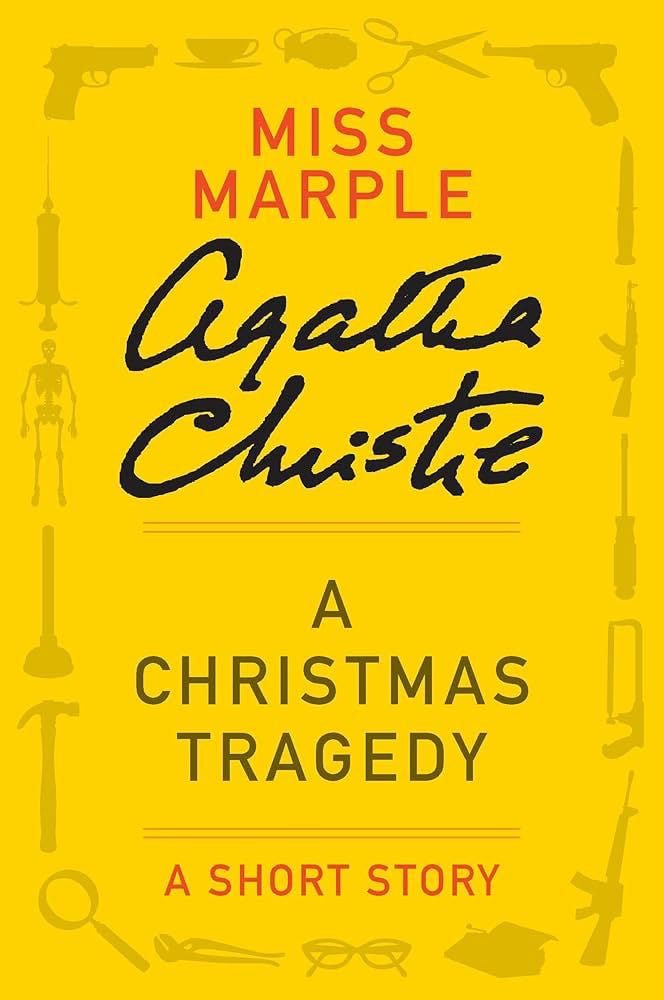Warning! Spoilers for “A Christmas Tragedy” throughout.
Happy holidays! In the land of Golden Age detection, the holiday season means one thing and one thing only: Christmas themed murders. Next week we’ll take on a full-length novel, Rupert Latimer’s Murder After Christmas, but this week we’ll ease into the holiday spirit with a Miss Marple short story.
“A Christmas Tragedy” is from The Thirteen Problems, a collection of short stories centered around a gathering of friends and Marple regulars (the Bantrys, Sir Henry Clithering) who take turns telling mystery stories, which the other guests are then challenged to solve before the true answer is revealed. Of course Miss Marple always knows what’s what (Dolly Bantry not so much).
In “A Christmas Tragedy” it is her turn to stump her friends, and she does so with a shockingly un-Christmasy tale of murder. It is a sad and tawdry little story concerning the murder of a young woman at a wellness resort Miss Marple visited years earlier.
That Mr. Sanders has killed his wife is never in any doubt; Miss Marple has a feeling, from the moment she meets him, that he plans to do so. An incident on a tram, where he appears to stumble into his wife, who is subsequently saved from tumbling down a flight of stairs by the conductor, immediately sets Miss Marple on edge. Because she has been observing people for so long, she explains, she knows things:
What my nephew calls ‘superfluous women’ have a lot of time on their hands, and their chief interest is usually people. And so, you see, they get to be what one might call experts. Now young people nowadays - they talk very freely about things that weren’t mentioned in my young days, but on the other hand their minds are terribly innocent. They believe in everyone and everything. And if one tries to warn them, ever so gently, they tell one that one has a Victorian mind - and that, they say, is like a sink.
So when Mrs. Sanders is found dead in her room her suspicions are justified. The young couple, who are hard up for cash (she has an inheritance that provides a small allowance, but she cannot touch the capital - aka motive), are staying in a small room in the servants quarters, where, to add to the bleakness of their circumstances, two servants have recently died: one, a porter who died of bronchitis and the other a housemaid who has just died of sepsis. Their room is small and cramped and connected to the other servants rooms by a balcony on the outside.
Both the husband and wife had gone out earlier in the afternoon - he to do some Christmas shopping and she to meet friends for a game of bridge. He returns in the evening and enlists Miss Marple and another older woman to help him choose a gift for his wife from the options he has in his room. When they open the door, they find the body on the floor, the head, though covered by a hat, clearly smashed by the sandbag on the floor next to the body. Miss Marple stops the husband from approaching and goes to the body herself, feeling for a pulse. Finding the body ice cold, she pronounces that nothing can be done other than call for the police. The door is locked until they arrive.
Miss Marple’s worst fears have been realized: Mr. Sanders has killed his wife and she was unable to prevent it from happening. As there is no question of whodunnit - there are no other suspects - it becomes a question of how, given that the husband has an airtight alibi for the time of the murder (and Miss Marple is never wrong). The answer is rather gruesome, involving switching the body of the dead maid for his wife’s, and then murdering her while the police are on their way and switching the bodies back again, the connecting balcony providing access to the locked room. Miss Marple is able to uncover the truth when she realizes the hat has been removed from the body in between its discovery and the arrival of the police. In fact, it was the housemaid’s hat, and was too small for the wife’s head, something her husband only realized when he switched bodies.
Casual fans of Miss Marple, particularly viewers of the series starring Geraldine McEwan, which leans into the twinkly-eyed charm of the character, is often categorized as a gossipy little Victorian spinster who solves crimes, which neglects an important aspect of her character. Miss Marple is not soft. She is not cuddly.
As Martin Edwards notes in The Life of Crime: Detecting the History of Mysteries and their Creators (2022, Collins Crime Club), “Miss Marple was the antithesis of Sherlock Holmes: an elderly woman who had seen little of the world beyond her back garden, yet possesses great wisdom. Experience of village life has given her a deep understanding of human nature, which she deploys in solving puzzles. Like Father Brown, she often relies on intuition rather than on making deductions from physical evidence in the conscientious manner of Dr. Thorndyke.” (p.154)
Unlike Father Brown, for whom spiritual redemption was at least as important as earthly justice, Miss Marple has little sympathy for those who kill. In Nemesis, the last Miss Marple novel, she is charged with investigating a cold case by the recently deceased Jason Rafiel, who challenges her: “If you prefer to serve the cause of justice, I hope that you may at least find it interesting. Let justice roll down like waters. And righteousness like an everlasting stream.” Miss Marple is Nemesis, or divine justice. There is a hardness, an unforgivingness to her. At the conclusion of “A Christmas Tragedy,” Miss Marple says:
Sanders was hanged… And a good job too. I have never regretted my part in bringing that man to justice. I’ve no patience with modern humanitarian scruples about capital punishment.
It’s a bleak little Christmas tale, one in which a woman is killed by the man she loved, brought to justice by the heartbreaking fact that her hat cabinet was locked because it hid her Christmas gift for him. So when he disguised the housemaid as his wife, he couldn’t switch out the hats, and thus sealed his fate. Only the eagle-eyed Miss Marple would notice such a minor detail. Nemesis, indeed.
Further reading listening: There is a typically excellent episode of the All About Agatha podcast that does a deep dive into this story. It’s from way back in 2017 but is still available and is worth a listen.
Next Tuesday: Murder After Christmas by Rupert Latimer







